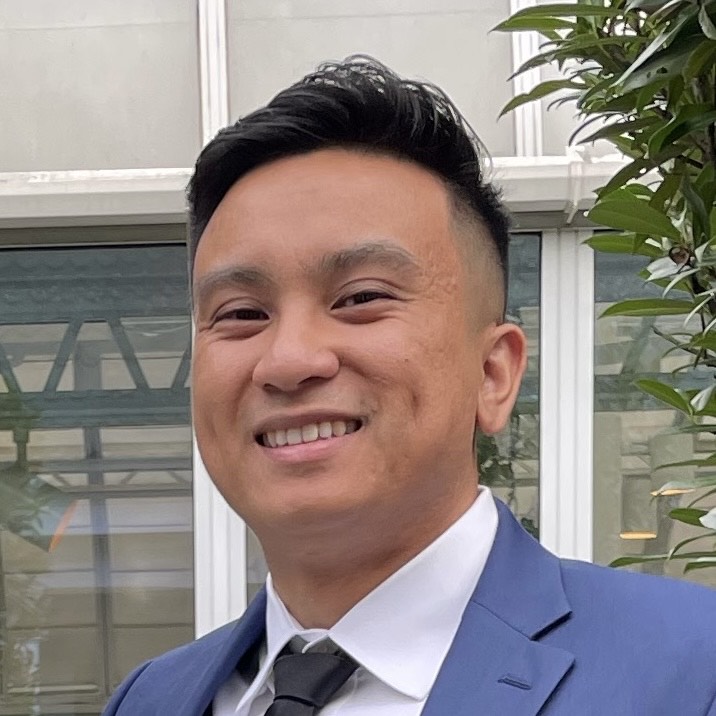Main Content
Learn how EPH helped alumni and instructor Enrico Cabredo secure job offers and discover his rewarding—and surprising—professional trajectory.

EPH is the best foot in the door to the world of local public health in New Jersey and beyond.
– Enrico “Rico” Cabredo
Being on television often sounds glamorous, but when you’re battling a local hepatitis outbreak in your community, it’s just part of the job. “We had these large outbreaks and some of them ended up on the news,” Enrico “Rico” Cabredo says of his time as Monmouth County’s Assistant Health Officer. “It makes people really, really sick. You can even die from it if you’re more at-risk.” Hepatitis A is tricky; it’s foodborne but it also can spread from person to person. Ultimately, the outbreak was contained through surveillance, vaccination, and education.
If it weren’t for Rico’s training in the Environment and Public Health program (EPH) at Rutgers and his experience as a Registered Environmental Health Specialist (REHS), the outcome might have been far worse. “Because I had the REHS background and the experience as an epidemiologist and communicable disease investigator, I was able to act really quickly,” Rico adds, describing his department’s response after a particular hepatitis case in Asbury Park. “We were able to attack the public health problem right away and prevent anyone else from getting sick. It got pretty scary, but we made sure everyone was safe.”
EPH Got Me that Job
Rico completed the EPH summer program after his junior year at Rutgers University. Graduates of EPH are eligible to sit for the REHS exam, and this is the typical progression EPH students follow into their public health careers. Rico, however, jumped immediately into a master’s degree program in public health, graduating with his MPH from Tulane University before securing a food safety specialist position with VII Principles, a consulting firm serving restaurants in the Philadelphia area. When he started, Rico joined a team that had three other EPH graduates on it.
“The CEO at the time would say that anyone coming out of the EPH course had a good mindset and the skills they were looking for,” Rico explains. “They respected the course and the field training. The fact that I went through EPH essentially got me that job.”
Rico echoes the advice of so many EPH instructors and alumni: networking is critically important. “Every job I’ve held since taking the EPH course was, in one way or another, linked to someone in the course—either they told me about it, recommended me for it, or told me how to be successful at it.”
Opportunities for REHSs
Although it wasn’t required for the position, VII Principles valued the REHS license he was missing. While sitting for the exam was always a part of his plan, Rico was delighted to learn his new employer would sponsor him to take it.
“They wanted me to get the REHS license so they could expand in New Jersey and it helped boost their reputation in Philly as well,” Rico says. With high-end clients like the STARR Restaurant Group and Garces Group, a sterling reputation was important.
His REHS license would continue to serve him well while working for the Monmouth County Health Department. “I did septic inspections, wells, restaurants, dog releases—everything that the REHS has enforcement powers to do.”
Rico reminds colleagues that they can also be involved in other important functions of local health. “REHSs can do communicable disease prevention, education, and even epidemiology.” The pandemic only reinforced the importance of this work in both the public and private sector. “During COVID, there was new recognition of the work that REHSs do and how important it is to make sure society can carry on.”
When asked what he loved about being an REHS, Rico immediately points to the field work. “You get to be out in the field. You’re interacting with people. You’re very involved with the community. It’s really rewarding because you get to see a lot of the action and make a difference.”
A Non-traditional Path: REHS to Epidemiologist
His talents and networking helped him rise through the ranks, becoming a Communicable Disease Epidemiologist with the New Jersey Department of Health in 2024. Rico laughs that his journey from EPH to a County and Regional Epidemiologist is not typical, but he encourages others to follow a similar path because that experience has enabled him to excel in his current role.
“If there was an outbreak in a nursing home or a school that was out of control, I would go and do an environmental infection control survey based off of what I knew as an REHS and what I knew as a communicable disease epidemiologist to identify the gaps in infection control and lessen incidences of new cases,” Rico explains.
Rico credits his REHS background and EPH training as being helpful not only in tackling foodborne illness outbreaks like the hepatitis A surge, but also anything spreading in the environment, such as various waterborne diseases.
“You have to understand the background of why things work and understand how to implement control measures,” Rico states. “And I don’t think there’s anyone else that can handle anything like that in New Jersey better than an REHS that goes through the EPH course.”
A Bright Future
In his new role with NJ Department of Health, Rico provides guidance and resources to local and county health departments with their outbreak investigations. He also makes time to come back to the EPH program every summer to share his experiences and career advice with students in the class. Most of all, he’s excited about the positive influence the EPH program and its graduates have in the world of public health.
“EPH is the best foot in the door to the world of local public health in New Jersey and beyond; we’re seeing a lot of influence outside of the state. I don’t see that changing—if anything that’s gotten bigger and stronger.”